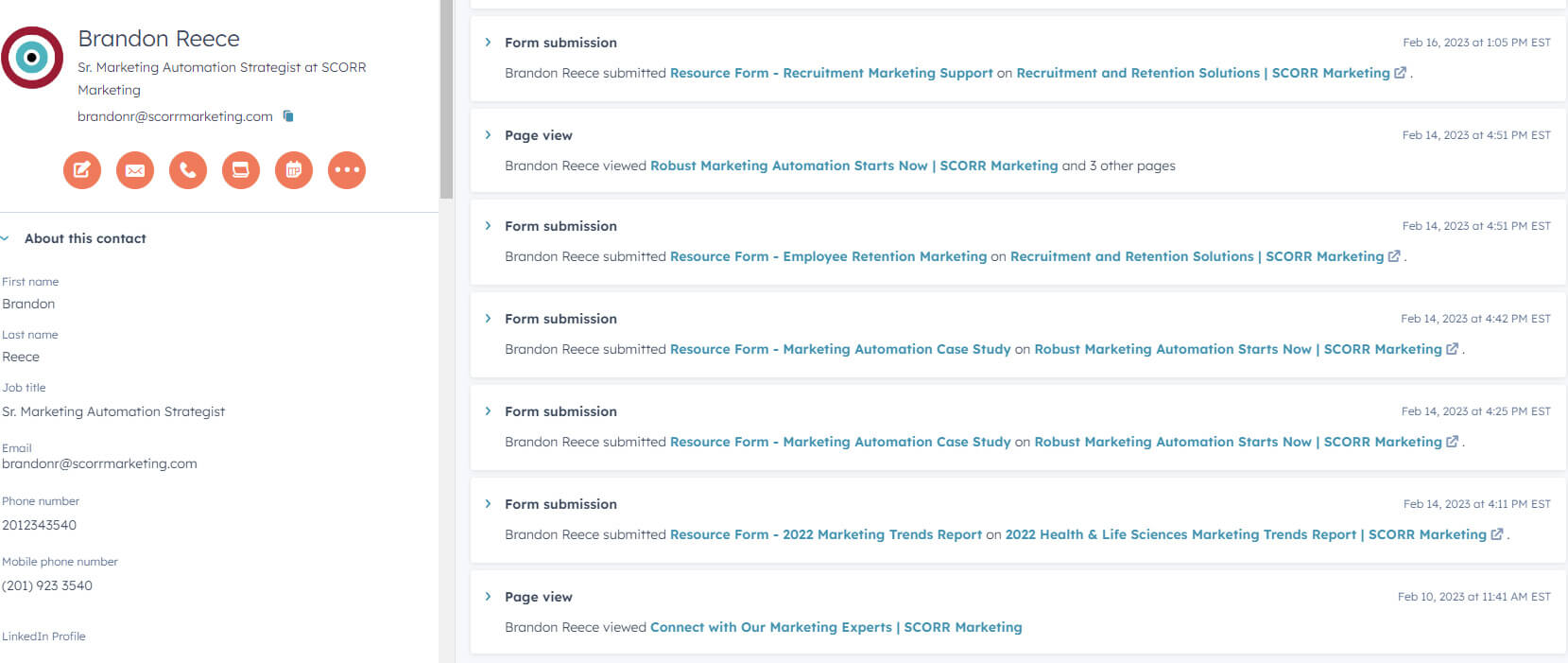Sometimes, the first step in a journey is the hardest. But since you’re here, we’ve got good news. You’ve already taken your first step toward marketing automation. While this is an investment upfront, the long-reaching benefits and efficiencies will supercharge your marketing efforts for years to come.
Marketing automation is the utilization of technology that manages marketing processes and campaigns, across multiple channels, automatically.
Automating your marketing strategy helps with lead generation, nurturing, and scoring, as well as with measuring overall ROI on marketing and sales campaigns.

A company’s ability to create, initiate, and perfect lead processes from the first click to opportunity stage through marketing automation propels marketing and sales effectiveness and efficiency.
Perfecting your lead processes will bolster your marketing initiatives with:
- Improved prospect engagement
- Minimization of manual tasks
- Improved lead quality
- Streamlined marketing and sales efforts
As all journeys start somewhere, the first step of marketing automation begins with your lead sources.
TAKING THE FIRST STEP: LOOKING AT YOUR LEAD SOURCES
A lead source is the channel through which a lead initially discovers your company. Sources can include your website, social media, paid advertising, paid search, conferences, and email marketing. Each type of lead source has a different path; each of these paths will make up your overall lead process.
For instance, a lead coming from social media would reach your customer relationship management (CRM) in ways that might differ from a lead that opened an email. Of course, both leads have interacted with your marketing assets but leads hold different weights, or importance, based on your sales funnel.

This is helpful so you can accurately attribute the success of every lead source to optimize future marketing efforts. It also helps you determine how your most valuable, and qualified, leads are engaging with each source.
As leads start to populate the system with valuable lead source information, your team can accurately tie lead sources to closed/won opportunities, and, in turn, develop better budget strategy via sales attribution.
Some important questions to consider when reviewing the process include:
- Which lead source gives us the most leads?
- Which lead source is closing the most business?
- Which lead source is not performing like the other lead sources?
- Which lead source is rewarding the most sales opportunities?
- Which lead source needs a higher budget in the next year?
As your lead and sales processes start to populate with new potential clients from lead sources, the beauty of CRMs starts to show with utilization of marketing automation workflows.
MARKETING AUTOMATION WORKFLOWS: THE LEGS OF THE OPERATION
Automation workflows can revitalize how leads funnel from the lead source to your sales team. These workflows are essentially the road map that defines what should happen to your new lead at every step of the journey.
While workflows will vary across everyone’s CRM, their ability to minimize manual tasks and improve lead quality stands true.
Workflows can help with:
- Lead assignment rules to your sales team
- Automated emails after a form completion
- Drip campaigns to nurture leads
- Adding prospects to open lead lists
- Tagging prospects to campaigns to measure their effectiveness

In many cases, it is important to “strike while the iron is hot.” The more timely and relevant your emails are, the more likely the lead is to engage.
Everyone’s implementation of workflows is subjective to your CRM and sales process. Your form strategy, workflows, and custom objects within the CRM define how the system will work wonders for your lead processes.
SETTING THE PACE
Let’s focus on your leads for a second. How do you ensure your sales teams are seeing the most qualified leads? How do you qualify leads as they come into your CRM?

Qualifying leads will make your platform come to life and deliver amazing ROI, now and in the future. It is crucial to shape this strategy in a way that aligns with your business and fits alongside your current lead generation.
There are a couple of ways to ensure this gets done well.
- Qualify leads by scoring them
based on:
- Email opens
- Social media clicks
- Content downloads
- Qualify leads by characteristics, or lead grading, by looking at:
- Job title
- Company name
- Salutation
Or, your team can utilize both lead scoring and grading!
From email activity to webinar registrations, prospect engagement history lives on every prospect’s record within the CRM, making marketing and sales teams empowered and equipped to chase down leads and tailor conversations based on their interactions with your content.

READY TO WALK THE PATH WITH US?
As leads collect points, are graded, scored, and funnel through workflows, your CRM system will become busy and require your ongoing attention.
CRM systems demand a great degree of care and attention to detail to thrive. In an ideal world, updating and maintaining these systems occurs daily and happens in complete collaboration with your sales and marketing teams.
At SCORR, we provide full service Marketing Automation Discovery, Implementation, and Support services with proven digital experts who can guide you through each step of the process in establishing a thoughtful automation strategy informed by lead process workshops and lead scoring recommendations.
With more than 50 successful marketing automation campaigns executed across various platforms, we have the know-how and hands-on experience needed to optimize our clients’ performance every single day.
